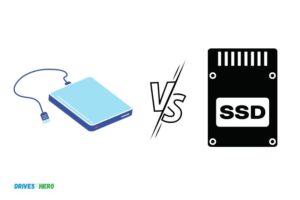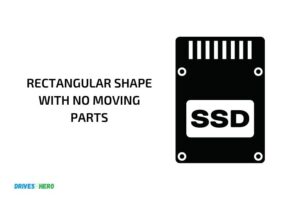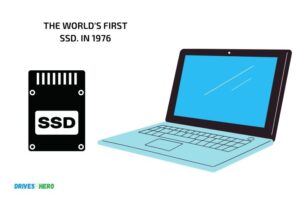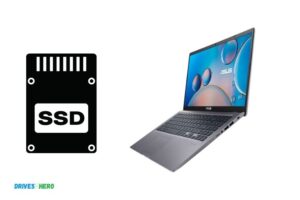What is Ssd in Laptop? Explained
An SSD, or Solid State Drive, in a laptop, is a type of storage device that uses NAND-based flash memory to store data, providing faster read and write speeds, and improved durability compared to traditional spinning hard disk drives (HDDs).
SSDs are an essential component in modern laptops as they offer numerous advantages over traditional HDDs.
Firstly, they have no moving parts, which translates to increased durability and a lower chance of mechanical failure.
Secondly, SSDs boast significantly faster data transfer speeds, resulting in quicker boot times, faster file transfers, and improved overall system performance.
Finally, because they are more energy-efficient, SSDs contribute to longer battery life in laptops.
SSDs in laptops have become increasingly popular over the years due to their numerous benefits, such as their faster data transfer speeds and increased durability.
As a result, they have become a crucial component in improving overall system performance and user experience.
Not only do SSDs enable quicker boot and loading times, but they also contribute to longer battery life, making them an essential feature in modern laptops.
Features of SSD in Laptops
| Feature | Description |
|---|---|
| Name | SSD (Solid State Drive) |
| Purpose | Storage Device |
| Type | Non-volatile Memory |
| Laptop Usage | Replaces HDD (Hard Disk Drive) |
| Advantages | Faster Speed, Less Power Consumption, Less Heat Generation, More Durable |
| Disadvantages | Higher Cost, Limited Write Cycles |
| Common SSD Types | SATA, NVMe, M.2 |
| Storage Capacity | Ranges from 128GB to 8TB (Varies by Model) |
Key Takeaway
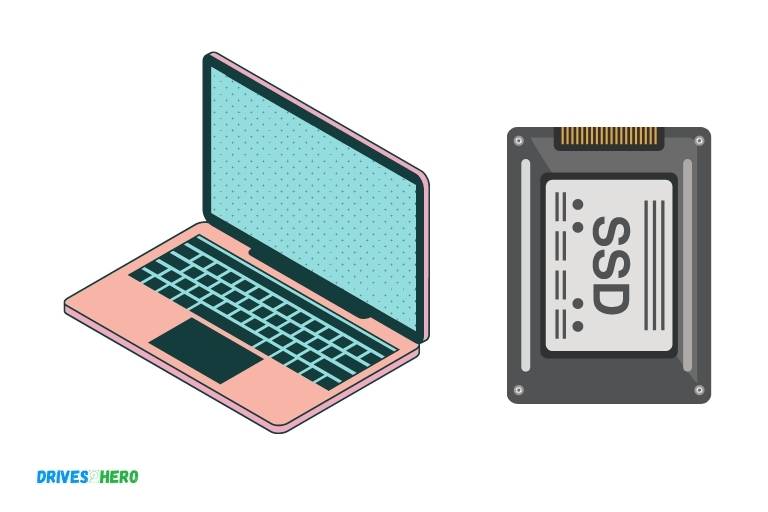
Five Surprising Benefits of SSD in Laptops
Understanding The Basics Of Ssd
Ssd or solid-state drive is a type of storage device that is becoming increasingly popular in laptops. Unlike traditional hard disk drives (hdds), an ssd does not have any moving parts, which make it faster and more reliable.
In this post, we will explore the basics of ssds and why they are a better choice than hdds in laptops.
Introduction To Ssds
An ssd, as mentioned earlier, is a storage device that uses nand-based flash memory to store data. It is designed to replace the traditional hard disk drive in laptops and desktops.
It has no mechanical components, so it is quiet, fast, and more durable than hdds.
Here are some other important things to know about ssds:
- Ssds use less power than hdds, making them ideal for laptops. This also means longer battery life.
- They have faster read and write speeds than hdds, which improves system performance and boot times.
- Ssds are resistant to physical shock and vibrations, which makes them more reliable in mobile applications.
How Ssds Are Different From Hdds
While both hdds and ssds serve the same purpose (storing data), they differ significantly in design and functionality.
Here are some differences worth noting:
- Hdds are slower than ssds because they use a spinning disk to read and write data. Ssds, on the other hand, have no moving parts, so they can access data more quickly.
- Ssds perform better than hdds when it comes to sequential read and write operations. This means that they are better suited for tasks that require high data transfer speeds, such as video editing or gaming.
- Hdds are bulkier and less durable than ssds. Since they contain moving parts, they are prone to wear and tear, which means they are more likely to fail.
Benefits Of Using Ssds In Laptops
The benefits of using ssds in laptops are numerous.
Here are some of the key advantages:
- Improved performance: Ssds are faster than hdds, which leads to improved system performance, faster boot times, and quicker application launches.
- Durability: Ssds are less prone to damage than hdds, making them a better choice for mobile applications. Also, since they have no moving parts, there is less chance of mechanical failure.
- Battery life: Since ssds use less power than hdds, they can help extend the battery life of laptops, which is crucial if you need to work on the go.
- More storage options: While hdds are available in larger capacities, ssds are catching up. Nowadays, you can get ssds with capacities up to 4tb.
- Quieter and more efficient: Ssds produce less heat and noise than hdds, which makes them quieter and more efficient.
Ssds are a superior choice when it comes to laptop storage. They are faster, more durable, and more power-efficient than hdds. With ssds becoming more affordable, there is no reason not to make the switch.
By choosing to use an ssd, you can enjoy improved performance, extended battery life, and faster access to your files.
Types Of Ssds For Laptops
As laptops become more popular, ssds (solid state drives) have replaced traditional hard drives. Ssds are faster and more reliable than hard drives, making them ideal for laptops.
There are three main types of ssds for laptops, each with their own advantages and disadvantages.
Sata Ssds
Sata (serial advanced technology attachment) ssds are the most common type of ssds for laptops.
They connect to the laptop’s motherboard using the same interface as traditional hard drives, which makes them easy to install.
Here are some key points about sata ssds:
- They are affordable and widely available, making them a popular choice for budget laptops.
- They have slower read and write speeds than other types of ssds.
- They are available in a range of storage capacities, from 128 GB to 2 TB.
Nvme Ssds
Nvme (non-volatile memory express) ssds are the fastest type of ssds for laptops. They use a high-speed interface that allows them to transfer data at much faster rates than sata ssds.
Here are some key points about nvme ssds:
- They are more expensive than sata ssds but offer faster read and write speeds.
- They come in smaller form factors, which allows laptop manufacturers to create slimmer and lighter laptops.
- They are available in a range of storage capacities, from 256gb to 2tb.
Pcie Ssds
Pcie (peripheral component interconnect express) ssds are another type of ssds for laptops. They connect to the laptop’s motherboard using pcie slots, which offer faster data transfer rates than sata interfaces.
Here are some key points about pcie ssds:
- They are the fastest ssds available for laptops, with read and write speeds that can be up to four times faster than sata ssds.
- They are the most expensive type of ssd and are only found in high-end laptops.
- They are available in a range of storage capacities, from 256 GB to 2 TB.
Each type of ssd has its own advantages and disadvantages. Sata ssds are affordable and widely available, nvme ssds are fast and come in smaller form factors, and pcie ssds are the fastest but also the most expensive.
When choosing an ssd for your laptop, consider your budget and performance need to find the best fit.
Video On What is Ssd in Laptop
Considerations When Choosing An Ssd For Laptops
Solid-state drives (ssds) have revolutionized the laptop storage industry, offering several advantages over traditional hard disk drives (hdds) such as faster read and write speeds, responsiveness, and durability.
However, not all ssds are created equal; therefore, it is crucial to consider various factors before making a purchase decision.
Here are the key considerations when choosing an ssd for laptops.
Price And Capacity
One of the most important things to consider when selecting an ssd for a laptop is price and storage capacity.
Ssd prices vary depending on the storage capacity and brand, making it essential to check their pricing and compare various brands.
However, don’t just focus solely on price; ensure the ssd has enough storage capacity to store all your files, documents, and programs.
- Ssd prices vary based on storage capacity.
- Compare prices across different brands.
- Consider the storage capacity before making a purchase.
Read And Write Speeds
Ssds are faster than traditional hard drives because they have no moving parts.
Therefore, the read and write speeds are higher, making it essential to consider the performance of an ssd before purchasing.
The speed and responsiveness of the laptop depend on the ssd used; hence the faster the read and write speeds of the ssd, the better the performance.
Look for an ssd with above-average read and write speeds to ensure that the laptop operates at optimal levels.
- Ssds read and write data faster than hdds.
- Faster read and write speeds translate to improved laptop performance.
- Consider ssds with above-average read and write speeds for optimal laptop performance.
Durability And Reliability
Ssds are more durable than hdds; they are not susceptible to mechanical failures or damage from physical shock. They have no moving parts, making them ideal for laptops that are always on-the-go.
However, not all ssds are built equally, which is why it is crucial to consider durability, lifespan, and reliability before making a purchase.
- Ssds are more durable than hdds.
- Consider the lifespan and reliability of the ssd.
- Look for ssds that are built to last to ensure reliability and longevity.
Compatibility With Laptop
It is also crucial to ensure that the ssd is compatible with the laptop before making a purchase.
Check the ssd’s interface and ensure it matches the laptop’s interface; otherwise, it will not fit. The most common interface types for laptops are sata, m.
2, nvme, and pcie. Ensure that the ssd you choose is compatible with your laptop.
- Ensure that the ssd’s interface matches the laptop’s interface.
- The common interface types for laptops are sata, m.2, nvme, and pcie.
- Check compatibility before making a purchase to ensure it works with your laptop.
Choosing the right ssd for a laptop can be a daunting task, but by considering these key factors – price and capacity, read and write speeds, durability and reliability, and compatibility, you can buy the best ssd that meets your needs and budget.
Installing An Ssd In Your Laptop
Preparing Your Laptop For Ssd Installation
Before you start installing an ssd into your laptop, it’s essential to prepare your device.
Here are several important steps to follow:
- Back up all your data before beginning the installation process. This way, you can safeguard your information in case you accidentally delete or lose any data during the process.
- Clean your laptop’s internals to remove dust and debris. To prevent any static damage to your device, wear an anti-static wristband if possible.
- Create a bootable usb drive with cloning software, which will allow you to clone your current hard drive’s data onto the new ssd.
Choosing The Right Ssd For Your Laptop
Picking the right ssd for your laptop is an important factor to consider for a successful installation.
Here are some key points to think about before choosing an appropriate ssd for your device:
- Consider the storage capacity you will need. Look for an ssd that can provide sufficient storage for your applications, documents, and media files.
- Choose a reliable brand with a good reputation in the marketplace. Companies such as samsung, crucial, and kingston offer high-quality ssds that are commonly used in laptops.
- Look for an ssd model that is compatible with your laptop’s sata interface and the form factor (size) of the drive bay.
Cloning Your Current Hard Drive To Ssd
Cloning your current hard drive to an ssd can facilitate a smooth transition to the new storage system without losing any of your data.
Here are the key points to remember when cloning your current drive:
- Connect your new ssd to your laptop through a usb enclosure to allow the cloning software to read and transfer the data.
- Launch the cloning software and select the source drive (the old hard drive) and the target drive (the new ssd).
- Follow the software’s instructions to transfer the contents of the old drive to the new ssd. This step can take a few hours, depending on the size of your old hard drive.
Installing And Configuring Your Ssd
Once you’ve cloned your hard drive, it’s time to install your ssd into your laptop.
Here’s how to do it:
- Shut down your laptop and remove the battery and any external power source.
- Open the laptop’s case and locate the hard drive bay.
- Unplug the old hard drive and insert the ssd into the bay.
- Fasten the ssd into place and reassemble your laptop.
- Boot up your laptop and enter bios to configure your new ssd as the primary boot drive.
- Start your laptop and confirm that your operating system and software are working correctly on the new ssd.
By following these guidelines, you can successfully install an ssd into your laptop. You’ll notice a significant improvement in your laptop’s performance and speed, providing a better user experience.
Accelerating Laptop Performance With Ssds
Ssd or solid state drives are the latest buzz in the world of computing and laptops. Ssds help laptops to operate at lightning speed.
Do you want to speed up your laptop, improve boot and load times, enhance your gaming experience, and optimize it for multitasking?
Then, read on! In this blog, we will explore how ssds can revolutionize the world of laptops and how they can be used to improve their performance.
Improve Boot And Load Times
Waiting for your laptop to boot up and load your favorite applications can be frustrating and time-consuming.
By replacing the conventional hard drive with ssd, you can experience a drastic improvement in your laptop’s boot-up time and application launch speeds.
An ssd reduces the amount of time it takes for the operating system and application programs to load, which in turn, improves the overall performance of your laptop.
- Ssds have a faster read-write speed, ranging from 200 mbps to 550 mbps, as compared to traditional hard drives that offer read-write speeds ranging from 50 mbps to 120 mbps.
- An ssd has no moving parts, which significantly reduces its access time, leading to fast boot time.
Increase Productivity And Efficiency
Productivity and efficiency are the ultimate goals of every laptop user, and ssds can help you achieve them. Ssds can help you access your data faster, multitask seamlessly, and complete your work efficiently.
- Ssds can read and write large files with lightning-fast speed, making it easy to open programs, images, and video files.
- With an ssd, you can multitask with ease, opening multiple applications without any lag or performance drop.
- Due to their efficient data access, ssds can help you complete tasks faster, increasing your productivity.
Enhance Gaming Experience
Gaming is one of the most demanding activities on a laptop, and an ssd can make a big difference in your gaming experience.
Faster load times, high frame rates, and quick game saves are some of the benefits of having an ssd in your laptop.
- An ssd can help in reducing the game’s loading time, which can significantly improve the gaming experience.
- Due to their faster read-write speed, ssds can enable faster data access, which translates to quicker frame rates in games.
- Ssds are more durable than traditional hard drives, meaning they can handle more read and write cycles, making them a perfect fit for gamers who want a laptop that can withstand long gaming sessions.
Optimize Laptop For Multitasking
Multitasking is essential for laptop users who want to complete multiple tasks simultaneously.
An ssd can optimize your laptop for multitasking by allowing you to switch between different applications without any lag.
- An ssd can significantly reduce a laptop’s boot time, which is a common bottleneck for many laptop users.
- With an ssd, you can open multiple programs and switch between them instantly without experiencing any lag or slow-down.
- Ssds have larger cache sizes that allow them to manage multiple data requests simultaneously, rendering data access more streamlined and efficient, making it easier to work with several applications simultaneously.
An ssd can enhance your laptop experience by providing faster boot times, quicker application loads, improved multitasking, and enhanced gaming experience.
By investing in an ssd, you can significantly increase your laptop’s performance and overall productivity. Don’t wait, switch to ssd today and experience the difference in speed and performance that it can provide.
Frequently Asked Questions On What Is Ssd In Laptop
What Is Ssd In Laptop?
Ssd stands for solid-state drive, a storage device that uses flash-based memory instead of moving parts.
What Are The Benefits Of Having An Ssd In A Laptop?
Ssd provides faster boot times, quicker application launches, improved battery life, and increased data security.
How Do I Know If My Laptop Has An Ssd Or Not?
If your laptop has an ssd, it will likely state it on the packaging or in the product specifications.
You can also check in your laptop settings or by opening the laptop case and visually inspecting it.
Can I Upgrade My Laptop To Have An Ssd?
Yes, you can generally upgrade your laptop with an ssd.
However, it is important to check if your laptop is compatible with ssds and consult a professional if you are unsure how to perform the upgrade.
Conclusion
As technology continues to advance, laptops are becoming faster, lighter, and more efficient. One major advancement in laptop technology is the ssd, or solid-state drive.
Ssds offer faster data access and transfer speeds, longer lifespans, and lower power consumption compared to traditional hard drives.
Additionally, having an ssd in your laptop can significantly improve the overall performance of your device. It allows for faster boot times, faster program launch times, and seamless multitasking.
Whether you are a student, professional, or gamer, having an ssd in your laptop can enhance your productivity and overall experience.
If you are in the market for a new laptop or looking to upgrade your current device, make sure to consider the benefits of an ssd. It may just be the performance boost you’ve been looking for.

